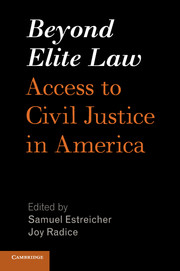Book contents
- Frontmatter
- Contents
- Beyond Elite Law
- Foreword
- List of Contributors
- Overview
- Overview
- PART I CURRENT STATE OF ACCESS TO LEGAL SERVICES
- PART II SOURCES OF LEGAL SERVICES ASSISTANCE FOR WORKING AMERICANS
- PART III FASHIONING A REFORM AGENDA
- 23 New York State Task Force to Expand Access to Civil Legal Services
- 24 New York's 50-hour Pro Bono Requirement
- 25 Starting a “Low Bono” Law Practice
- 26 Toward a More Effective and Accessible Solo and Small Firm Practice Model
- 27 Facilitating Homemade Wills
- 28 Court Facilitation of Self-Representation
- 29 Limited Representation and Ethical Challenges
- 30 Technology Can Solve Much of America's Access to Justice Problem, If We Let It
- 31 Mediation of Employment Disputes at the EEOC
- 32 AAA Consumer Arbitration
- 33 Saturns for Rickshaws: Lessons for Consumer Arbitration and Access to Justice
- 34 Employment Arbitration in the Securities Industry
- 35 FINRA Arbitration and Employment Disputes
- 36 Arbitration as an Employee-Friendly Forum
- 37 Access to Justice in Employment Arbitration: a Critical Look
- 38 Collaborative Technology Improves Access to Justice
- 39 Union Representation in Employment Arbitration
- 40 Legal Representation for New York City's Chinese Immigrant Workers
- 41 Reassessing Unauthorized Practice of Law Rules
- 42 The Pyett Protocol: Collectively-Bargained Grievance Arbitration as a Forum for Individual Statutory Employment Claims
- PART IV CREATING A CULTURE OF SERVICE
- Index
26 - Toward a More Effective and Accessible Solo and Small Firm Practice Model
from PART III - FASHIONING A REFORM AGENDA
Published online by Cambridge University Press: 05 May 2016
- Frontmatter
- Contents
- Beyond Elite Law
- Foreword
- List of Contributors
- Overview
- Overview
- PART I CURRENT STATE OF ACCESS TO LEGAL SERVICES
- PART II SOURCES OF LEGAL SERVICES ASSISTANCE FOR WORKING AMERICANS
- PART III FASHIONING A REFORM AGENDA
- 23 New York State Task Force to Expand Access to Civil Legal Services
- 24 New York's 50-hour Pro Bono Requirement
- 25 Starting a “Low Bono” Law Practice
- 26 Toward a More Effective and Accessible Solo and Small Firm Practice Model
- 27 Facilitating Homemade Wills
- 28 Court Facilitation of Self-Representation
- 29 Limited Representation and Ethical Challenges
- 30 Technology Can Solve Much of America's Access to Justice Problem, If We Let It
- 31 Mediation of Employment Disputes at the EEOC
- 32 AAA Consumer Arbitration
- 33 Saturns for Rickshaws: Lessons for Consumer Arbitration and Access to Justice
- 34 Employment Arbitration in the Securities Industry
- 35 FINRA Arbitration and Employment Disputes
- 36 Arbitration as an Employee-Friendly Forum
- 37 Access to Justice in Employment Arbitration: a Critical Look
- 38 Collaborative Technology Improves Access to Justice
- 39 Union Representation in Employment Arbitration
- 40 Legal Representation for New York City's Chinese Immigrant Workers
- 41 Reassessing Unauthorized Practice of Law Rules
- 42 The Pyett Protocol: Collectively-Bargained Grievance Arbitration as a Forum for Individual Statutory Employment Claims
- PART IV CREATING A CULTURE OF SERVICE
- Index
Summary
Juergens provides concrete strategies for solo and small firm practices including crafting transparent fee arrangements with clients, outsourcing or automating non-lawyer tasks, creating service hubs of legal and non-legal professional services, leveraging local community connections to complement bar ties, creating a web presence, and using law student externs.
The lawyers most in touch with the civil justice needs of average Americans are those in solo and small firms. They are a crucial yet undervalued resource for closing the access gap. To meet more need, solo and small practitioners must reimagine the ways that their services actually add value to the lives and transactions of average Americans. They must distill and enhance the value of their services even as they work to lower their cost to clients. Finally, lawyers must improve the ways that the value and risks of their services are communicated to average Americans.
DISTILLING THE ESSENTIAL IN THE SOLO AND SMALL FIRM SERVICE MODEL
In the current climate, the benefit small firm lawyers may bring to peoples’ lives and transactions is not apparent to most moderate-income Americans. While lawyers once controlled access to most legal information, that is no longer the case. Small firm lawyers have relied heavily on the skills of building relationships and trust in their service to middle-income clients, but now they must do more. They must focus their efforts, and become more sophisticated and certain about the ways they add value. This should lead them to remove, automate, or outsource the non-essential, then offer a more concentrated and individualized – and more valuable – set of services for middle-income clients.
As one common example, small-firm lawyers who learned to draft wills or file articles of incorporation can no longer go through a series of standard questions and charge clients by the hour for creating documents that the client can access for $100 or less on the internet. Rather, these lawyers must investigate when these forms are not sufficient or cannot be easily used by potential clients. They must explore new ways to serve by concentrating on families who need to plan for the long-term care of a disabled family member or on small enterprises that face more complex questions like those raised by regulatory agencies or licensing agreements.
- Type
- Chapter
- Information
- Beyond Elite LawAccess to Civil Justice in America, pp. 383 - 394Publisher: Cambridge University PressPrint publication year: 2016

